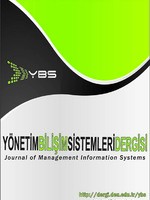Metin Madenciliği, Makine ve Derin Öğrenme Algoritmaları ile Web Sayfalarının Sınıflandırılması
Web Sayfa Sınıflandırması, Metin Madenciliği, Doğal Dil İşleme, Makine Öğrenmesi
Web Page Categorization with Text Mining, Machine and Deep Learning Algorithms
___
- Chen, Y., Cheng, B. ve Cheng, X. (2016). Food safety document classification using LSTM-based ensemble learning. Revista Técnica de la Facultad de Ingeniería Universidad del Zulia, 39(10), 172-178.
- Chen, R. C. ve Hsieh, C. H. (2006). Web page classification based on a support vector machine using a weighted vote schema. Expert Systems with Applications, 31(2), 427-435.
- Gali, N., Mariescu-Istodor, R. ve Fränti, P. (2017). Using linguistic features to automatically extract web page title. Expert Systems with Applications, 79, 296-312.
- Hartmann, J., Huppertz, J., Schamp, C. ve Heitmann, M. (2019). Comparing automated text classification methods. International Journal of Research in Marketing, 36(1), 20-38.
- Hilbe, J. M. (2011). Logistic regression. International encyclopedia of statistical science, 755-758.
- Internet Live Stats (2019). “Total Number of Websites”, https://www.internetlivestats.com/total-number-of-websites/ (erişim tarihi: 16.05.2019)
- Kowsari, K., Jafari Meimandi, K., Heidarysafa, M., Mendu, S., Barnes, L. ve Brown, D. (2019). Text classification algorithms: A survey. Information, 10(4).
- Li, Y. H. ve Jain, A. K. (1998). Classification of text documents. The Computer Journal, 41(8), 537-546.
- Loper, E. ve Bird, S. (2002). NLTK: the natural language toolkit. arXiv preprint cs/0205028.
- Manning, C., Raghavan, P. ve Schütze, H. (2010). Introduction to information retrieval. Natural Language Engineering, 16(1), 100-103.
- Netcraft (2019). “July 2019 Web Server Survey”, https://news.netcraft.com/archives/category/web-server-survey/ (erişim tarihi: 16.05.2019)
- Onan, A., Korukoğlu, S. ve Bulut, H. (2016). Ensemble of keyword extraction methods and classifiers in text classification. Expert Systems with Applications, 57, 232-247.
- Panigrahi, R. ve Borah, S. (2019). Classification and Analysis of Facebook Metrics Dataset Using Supervised Classifiers. In S. Borah, N. Dey, R. Babo & A. S. Ashour (Eds.), Social Network Analytics, Elsevier.
- Rekik, R., Kallel, I., Casillas, J. ve Alimi, A. M. (2018). Assessing web sites quality: A systematic literature review by text and association rules mining. International Journal of Information Management, 38(1), 201-216.
- Ren, X. Y., Shi, C., Zhang, D. ve Wang, W. S. (2019). An improved SVM web page classification algorithm. In Journal of Physics: Conference Series (Vol. 1187, No. 4, p. 042063). IOP Publishing.
- Shen, D., Yang, Q., & Chen, Z. (2007). Noise reduction through summarization for Web-page classification. Information Processing & Management, 43(6), 1735-1747.
- Sinoara, R. A., Camacho-Collados, J., Rossi, R. G., Navigli, R., & Rezende, S. O. (2019). Knowledge-enhanced document embeddings for text classification. Knowledge-Based Systems, 163, 955-971.
- Stein, R. A., Jaques, P. A., & Valiati, J. F. (2019). An analysis of hierarchical text classification using word embeddings. Information Sciences, 471, 216-232.
- Takenouchi, T., & Ishii, S. (2018). Binary classifiers ensemble based on Bregman divergence for multi-class classification. Neurocomputing, 273, 424-434.
- Xu, S., Li, Y., & Wang, Z. (2017). Bayesian multinomial Naïve Bayes classifier to text classification. In Advanced multimedia and ubiquitous engineering (pp. 347-352). Springer, Singapore.
- ISSN: 2630-550X
- Başlangıç: 2015
- Yayıncı: Vahap TECİM
DOLANDIRICILIK TESPİTİ ÜZERİNE MELEZ SINIFLANDIRMA VE REGRESYON AĞACI UYGULAMASI
Ebru PEKEL ÖZMEN, Tuncay ÖZCAN
YÜKSEKÖĞRETİM KURUMLARINDA BİLGİ GÜVENLİĞİ FARKINDALIK DÜZEYLERİNİN ÖLÇÜMLENMESİ
Fulya ASLAY, Handan ÇAM, Üstün ÖZEN
Veri Kültürü Oluşturmada Dijital Dönüşüm Liderlerinin Önceliklerinin Belirlenmesi
GRUP KARAR VERME YAZILIMI (GroupDM): TEZ DEĞERLENDİRMELERİ İÇİN ÖRNEK BİR UYGULAMA
Hakan AŞAN, Ejder AYÇİN, Onur DOĞAN
SİTE İÇİ ARAMA OPTİMİZASYONUNUN BİR WEBSİTESİ TRAFİĞİNDE NEDEN OLDUĞU DEĞİŞİMLERİN ÖLÇÜMLENMESİ
Metin Madenciliği, Makine ve Derin Öğrenme Algoritmaları ile Web Sayfalarının Sınıflandırılması
